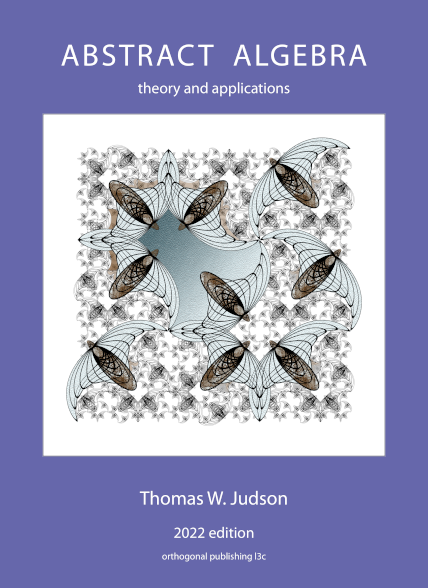Exercises 17.5 Exercises
1.
List all of the polynomials of degree \(3\) or less in \({\mathbb Z}_2[x]\text{.}\)
2.
Compute each of the following.
\((5x^2 + 3x - 4) + (4x^2 - x + 9)\) in \({\mathbb Z}_{12}[x]\)
\((5x^2 + 3x - 4) (4x^2 - x + 9)\) in \({\mathbb Z}_{12}[x]\)
\((7x^3 + 3x^2 - x) + (6x^2 - 8x + 4)\) in \({\mathbb Z}_9[x]\)
\((3x^2 + 2x - 4) + (4x^2 + 2)\) in \({\mathbb Z}_5[x]\)
\((3x^2 + 2x - 4) (4x^2 + 2)\) in \({\mathbb Z}_5[x]\)
\((5x^2 + 3x - 2)^2\) in \({\mathbb Z}_{12}[x]\)
3.
Use the division algorithm to find \(q(x)\) and \(r(x)\) such that \(a(x) = q(x) b(x) + r(x)\) with \(\deg r(x) \lt \deg b(x)\) for each of the following pairs of polynomials.
\(a(x) = 5 x^3 + 6x^2 - 3 x + 4\) and \(b(x) = x - 2\) in \({\mathbb Z}_7[x]\)
\(a(x) = 6 x^4 - 2 x^3 + x^2 - 3 x + 1\) and \(b(x) = x^2 + x - 2\) in \({\mathbb Z}_7[x]\)
\(a(x) = 4 x^5 - x^3 + x^2 + 4\) and \(b(x) = x^3 - 2\) in \({\mathbb Z}_5[x]\)
\(a(x) = x^5 + x^3 -x^2 - x\) and \(b(x) = x^3 + x\) in \({\mathbb Z}_2[x]\)
4.
Find the greatest common divisor of each of the following pairs \(p(x)\) and \(q(x)\) of polynomials. If \(d(x) = \gcd( p(x), q(x) )\text{,}\) find two polynomials \(a(x)\) and \(b(x)\) such that \(a(x) p(x) + b(x) q(x) = d(x)\text{.}\)
\(p(x) = x^3 - 6x^2 + 14x - 15\) and \(q(x) = x^3 - 8x^2 + 21x - 18\text{,}\) where \(p(x), q(x) \in {\mathbb Q}[x]\)
\(p(x) = x^3 + x^2 - x + 1\) and \(q(x) = x^3 + x - 1\text{,}\) where \(p(x), q(x) \in {\mathbb Z}_2[x]\)
\(p(x) = x^3 + x^2 - 4x + 4\) and \(q(x) = x^3 + 3 x -2\text{,}\) where \(p(x), q(x) \in {\mathbb Z}_5[x]\)
\(p(x) = x^3 - 2 x + 4\) and \(q(x) = 4 x^3 + x + 3\text{,}\) where \(p(x), q(x) \in {\mathbb Q}[x]\)
5.
Find all of the zeros for each of the following polynomials.
\(5x^3 + 4x^2 - x + 9\) in \({\mathbb Z}_{12}[x]\)
\(3x^3 - 4x^2 - x + 4\) in \({\mathbb Z}_{5}[x]\)
\(5x^4 + 2x^2 - 3\) in \({\mathbb Z}_{7}[x]\)
\(x^3 + x + 1\) in \({\mathbb Z}_2[x]\)
6.
Find all of the units in \({\mathbb Z}[x]\text{.}\)
7.
Find a unit \(p(x)\) in \({\mathbb Z}_4[x]\) such that \(\deg p(x) \gt 1\text{.}\)
8.
Which of the following polynomials are irreducible over \({\mathbb Q}[x]\text{?}\)
\(\displaystyle x^4 - 2x^3 + 2x^2 + x + 4\)
\(\displaystyle x^4 - 5x^3 + 3x - 2\)
\(\displaystyle 3x^5 - 4x^3 - 6x^2 + 6\)
\(\displaystyle 5x^5 - 6x^4 - 3x^2 + 9 x - 15\)
9.
Find all of the irreducible polynomials of degrees \(2\) and \(3\) in \({\mathbb Z}_2[x]\text{.}\)
10.
Give two different factorizations of \(x^2 + x + 8\) in \({\mathbb Z}_{10}[x]\text{.}\)
11.
Prove or disprove: There exists a polynomial \(p(x)\) in \({\mathbb Z}_6[x]\) of degree \(n\) with more than \(n\) distinct zeros.
12.
If \(F\) is a field, show that \(F[x_1, \ldots, x_n]\) is an integral domain.
13.
Show that the division algorithm does not hold for \({\mathbb Z}[x]\text{.}\) Why does it fail?
14.
Prove or disprove: \(x^p + a\) is irreducible for any \(a \in {\mathbb Z}_p\text{,}\) where \(p\) is prime.
15.
Let \(f(x)\) be irreducible in \(F[x]\text{,}\) where \(F\) is a field. If \(f(x) \mid p(x)q(x)\text{,}\) prove that either \(f(x) \mid p(x)\) or \(f(x) \mid q(x)\text{.}\)
16.
Suppose that \(R\) and \(S\) are isomorphic rings. Prove that \(R[x] \cong S[x]\text{.}\)
17.
Let \(F\) be a field and \(a \in F\text{.}\) If \(p(x) \in F[x]\text{,}\) show that \(p(a)\) is the remainder obtained when \(p(x)\) is divided by \(x - a\text{.}\)
18. The Rational Root Theorem.
Let
where \(a_n \neq 0\text{.}\) Prove that if \(p(r/s) = 0\text{,}\) where \(\gcd(r, s) = 1\text{,}\) then \(r \mid a_0\) and \(s \mid a_n\text{.}\)
19.
Let \({\mathbb Q}^*\) be the multiplicative group of positive rational numbers. Prove that \({\mathbb Q}^*\) is isomorphic to \(( {\mathbb Z}[x], +)\text{.}\)
20. Cyclotomic Polynomials.
The polynomial
is called the cyclotomic polynomial. Show that \(\Phi_p(x)\) is irreducible over \({\mathbb Q}\) for any prime \(p\text{.}\)
21.
If \(F\) is a field, show that there are infinitely many irreducible polynomials in \(F[x]\text{.}\)
22.
Let \(R\) be a commutative ring with identity. Prove that multiplication is commutative in \(R[x]\text{.}\)
23.
Let \(R\) be a commutative ring with identity. Prove that multiplication is distributive in \(R[x]\text{.}\)
24.
Show that \(x^p - x\) has \(p\) distinct zeros in \({\mathbb Z}_p\text{,}\) for any prime \(p\text{.}\) Conclude that
25.
Let \(F\) be a field and \(f(x) = a_0 + a_1 x + \cdots + a_n x^n\) be in \(F[x]\text{.}\) Define \(f'(x) = a_1 + 2 a_2 x + \cdots + n a_n x^{n - 1}\) to be the derivative of \(f(x)\text{.}\)
-
Prove that
\begin{equation*} (f + g)'(x) = f'(x) + g'(x)\text{.} \end{equation*}Conclude that we can define a homomorphism of abelian groups \(D : F[x] \rightarrow F[x]\) by \(D(f(x)) = f'(x)\text{.}\)
Calculate the kernel of \(D\) if \(\chr F = 0\text{.}\)
Calculate the kernel of \(D\) if \(\chr F = p\text{.}\)
-
Prove that
\begin{equation*} (fg)'(x) = f'(x)g(x) + f(x) g'(x)\text{.} \end{equation*} -
Suppose that we can factor a polynomial \(f(x) \in F[x]\) into linear factors, say
\begin{equation*} f(x) = a(x - a_1) (x - a_2) \cdots ( x - a_n)\text{.} \end{equation*}Prove that \(f(x)\) has no repeated factors if and only if \(f(x)\) and \(f'(x)\) are relatively prime.
26.
Let \(F\) be a field. Show that \(F[x]\) is never a field.
27.
Let \(R\) be an integral domain. Prove that \(R[x_1, \ldots, x_n]\) is an integral domain.
28.
Let \(R\) be a commutative ring with identity. Show that \(R[x]\) has a subring \(R'\) isomorphic to \(R\text{.}\)
29.
Let \(p(x)\) and \(q(x)\) be polynomials in \(R[x]\text{,}\) where \(R\) is a commutative ring with identity. Prove that \(\deg( p(x) + q(x) ) \leq \max( \deg p(x), \deg q(x) )\text{.}\)
